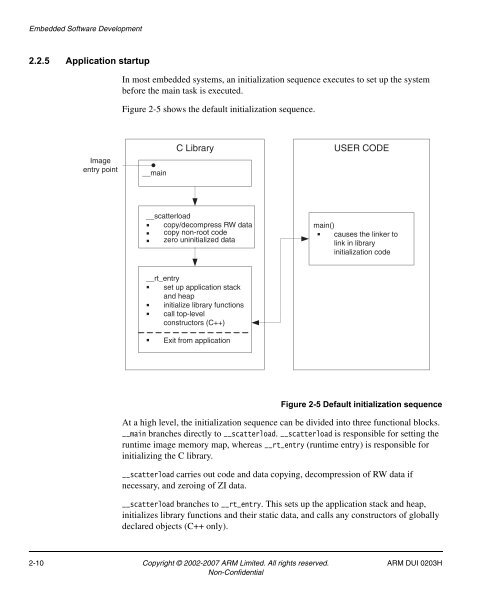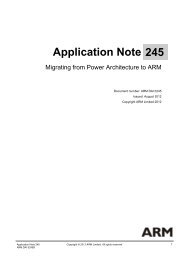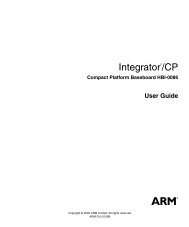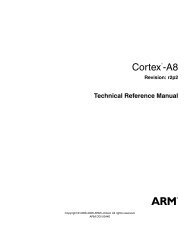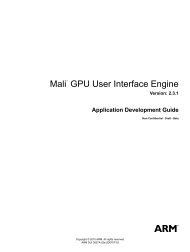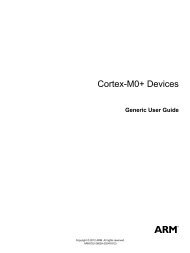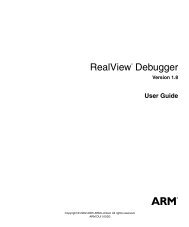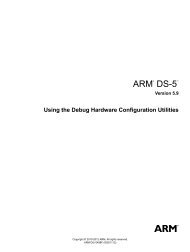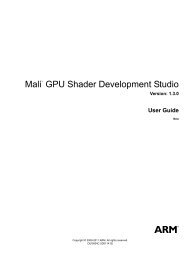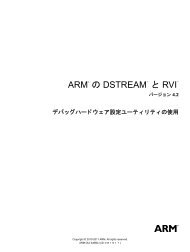- Page 1 and 2: ® RealView Compilation Tools Versi
- Page 3 and 4: Product Status The information in t
- Page 5 and 6: Contents RealView Compilation Tools
- Page 7 and 8: Contents A.2 Semihosting implementa
- Page 9 and 10: Preface This preface introduces the
- Page 11 and 12: Preface Chapter 6 Handling Processo
- Page 13 and 14: Preface • ARM Architecture Refere
- Page 15 and 16: Chapter 1 Introduction This chapter
- Page 17 and 18: Introduction 1.2 Developing for the
- Page 19 and 20: Introduction 1.2.4 Handling process
- Page 21 and 22: Introduction 1.2.6 Compatibility wi
- Page 23 and 24: Chapter 2 Embedded Software Develop
- Page 25 and 26: Embedded Software Development Note
- Page 27 and 28: Embedded Software Development 2.2.1
- Page 29 and 30: Embedded Software Development 2.2.3
- Page 31: Embedded Software Development 2.2.4
- Page 35 and 36: Embedded Software Development Examp
- Page 37 and 38: Embedded Software Development 2.4 T
- Page 39 and 40: Embedded Software Development 2.4.3
- Page 41 and 42: Embedded Software Development 2.4.5
- Page 43 and 44: Embedded Software Development SB ST
- Page 45 and 46: Embedded Software Development Avoid
- Page 47 and 48: Embedded Software Development Table
- Page 49 and 50: Embedded Software Development Prote
- Page 51 and 52: Embedded Software Development 1 2 3
- Page 53 and 54: Embedded Software Development To av
- Page 55 and 56: Embedded Software Development 2.5.7
- Page 57 and 58: Embedded Software Development 2.6 O
- Page 59 and 60: Embedded Software Development 2.6.2
- Page 61 and 62: Chapter 3 Writing Position Independ
- Page 63 and 64: Writing Position Independent Code a
- Page 65 and 66: Writing Position Independent Code a
- Page 67 and 68: Chapter 4 Interworking ARM and Thum
- Page 69 and 70: Interworking ARM and Thumb 4.1.2 Wh
- Page 71 and 72: Interworking ARM and Thumb For exam
- Page 73 and 74: Interworking ARM and Thumb 4.2 Asse
- Page 75 and 76: Interworking ARM and Thumb 4.2.3 Ex
- Page 77 and 78: Interworking ARM and Thumb 4. Run t
- Page 79 and 80: Interworking ARM and Thumb 4.3 C an
- Page 81 and 82: Interworking ARM and Thumb 3. To li
- Page 83 and 84:
Interworking ARM and Thumb Example
- Page 85 and 86:
Interworking ARM and Thumb Example
- Page 87 and 88:
Interworking ARM and Thumb Example
- Page 89 and 90:
Chapter 5 Mixing C, C++, and Assemb
- Page 91 and 92:
Mixing C, C++, and Assembly Languag
- Page 93 and 94:
Mixing C, C++, and Assembly Languag
- Page 95 and 96:
Mixing C, C++, and Assembly Languag
- Page 97 and 98:
Mixing C, C++, and Assembly Languag
- Page 99 and 100:
Mixing C, C++, and Assembly Languag
- Page 101 and 102:
Mixing C, C++, and Assembly Languag
- Page 103 and 104:
Mixing C, C++, and Assembly Languag
- Page 105 and 106:
Mixing C, C++, and Assembly Languag
- Page 107 and 108:
Chapter 6 Handling Processor Except
- Page 109 and 110:
Handling Processor Exceptions 6.1.1
- Page 111 and 112:
Handling Processor Exceptions 6.1.4
- Page 113 and 114:
Handling Processor Exceptions Examp
- Page 115 and 116:
Handling Processor Exceptions 6.3.2
- Page 117 and 118:
Handling Processor Exceptions instr
- Page 119 and 120:
Handling Processor Exceptions 6.4 H
- Page 121 and 122:
Handling Processor Exceptions LDR N
- Page 123 and 124:
Handling Processor Exceptions Examp
- Page 125 and 126:
Handling Processor Exceptions 6.6 S
- Page 127 and 128:
Handling Processor Exceptions The t
- Page 129 and 130:
Handling Processor Exceptions Examp
- Page 131 and 132:
Handling Processor Exceptions } pri
- Page 133 and 134:
Handling Processor Exceptions Examp
- Page 135 and 136:
Handling Processor Exceptions • e
- Page 137 and 138:
Handling Processor Exceptions In AR
- Page 139 and 140:
Handling Processor Exceptions 6.7.4
- Page 141 and 142:
Handling Processor Exceptions Byte
- Page 143 and 144:
Handling Processor Exceptions Figur
- Page 145 and 146:
Handling Processor Exceptions 6.9 U
- Page 147 and 148:
Handling Processor Exceptions 6.11
- Page 149 and 150:
Chapter 7 Handling Cortex-M3 Proces
- Page 151 and 152:
Handling Cortex-M3 Processor Except
- Page 153 and 154:
Handling Cortex-M3 Processor Except
- Page 155 and 156:
Handling Cortex-M3 Processor Except
- Page 157 and 158:
Handling Cortex-M3 Processor Except
- Page 159 and 160:
Handling Cortex-M3 Processor Except
- Page 161 and 162:
Handling Cortex-M3 Processor Except
- Page 163 and 164:
Handling Cortex-M3 Processor Except
- Page 165 and 166:
Handling Cortex-M3 Processor Except
- Page 167 and 168:
Handling Cortex-M3 Processor Except
- Page 169 and 170:
Handling Cortex-M3 Processor Except
- Page 171 and 172:
Chapter 8 Debug Communications Chan
- Page 173 and 174:
Debug Communications Channel 8.2 Ta
- Page 175 and 176:
Debug Communications Channel 8.3.2
- Page 177 and 178:
Debug Communications Channel Exampl
- Page 179 and 180:
Debug Communications Channel 8.5 Ac
- Page 181 and 182:
Appendix A Semihosting This chapter
- Page 183 and 184:
Semihosting printf("hello\n"); Appl
- Page 185 and 186:
Semihosting Changing the semihostin
- Page 187 and 188:
Semihosting A.2.4 RealMonitor RealM
- Page 189 and 190:
Semihosting A.3.2 angel_SWIreason_R
- Page 191 and 192:
Semihosting A.3.3 SYS_CLOSE (0x02)
- Page 193 and 194:
Semihosting Return On exit, r0 cont
- Page 195 and 196:
Semihosting Return On exit, r1 cont
- Page 197 and 198:
Semihosting The file position is at
- Page 199 and 200:
Semihosting A.3.17 SYS_SEEK (0x0A)
- Page 201 and 202:
Semihosting Entry There are no para
- Page 203 and 204:
Semihosting Return None. Register r


